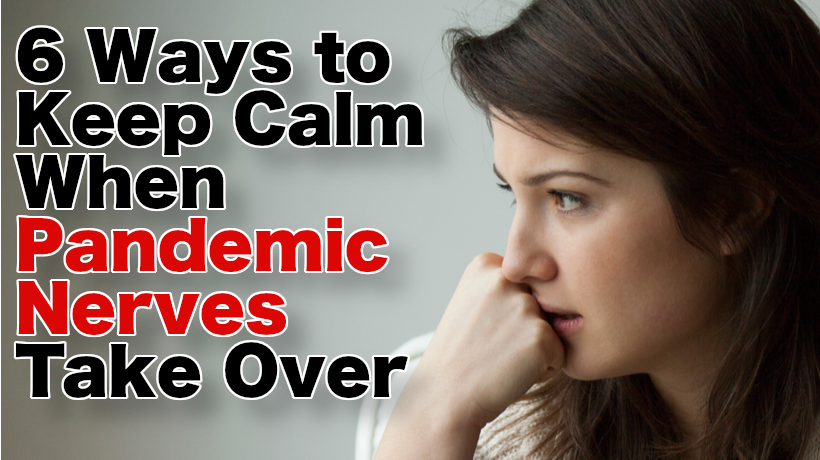With everything that has transpired over the last year, it’s hard not to have found yourself in a moment of stress that has felt more crippling than you’re typically used to. With winter coming, talk of a second wave has become constant, and it can be overwhelming. We’ve had to cope with stressors in our lives before, but the pandemic has become the thing that has pushed many “over the edge.” Here are a few tips to keep calm when “pandemic anxiety” takes over:
Control What You Can Control
Do you feel like your mind is constantly racing with questions about your health, your family’s health, your career, and more? Do you sometimes feel like you are living in fear of the “what ifs” you have surrounding the virus? Psychotherapist Amy Morin, LCSW, states, “When you find yourself worrying, take a minute to examine the things you have control over. You can’t prevent a storm from coming, but you can prepare for it. You can’t control how someone else behaves, but you can control how you react.”
Know what you can control in this situation. You can control whether you wear a mask, wash your hands regularly, or stay away from crowds. You can decide if you walk into a grocery store or order groceries online. You can decide if you go to a neighbor’s party or stay home that evening. While it might not be ideal for you to be in a “permanent” quarantine per se to stay safe, it can be comforting to know that you hold power over your potential exposure in certain instances. Make the best choices for yourself and try to let go of the things no longer in your hands.
Knowledge is Power
While the constant news might feel overbearing, try not to completely shut it off. The more you stay informed, the less you question. Stay current on the Center for Disease Control’s (CDC) updates and other reputable sources. Know the current information on how it spreads, the numbers of positive cases where you live, the symptoms to look out for, the nearest testing facilities and their procedures, etc. Seeking out this information makes you more prepared and knowledgeable. You can easily view stats of positive cases in your area online and many smartphones offer free applications that will update you on a rise or decrease in cases.
Have you gone somewhere crowded where you might have been exposed? Many facilities are offering free testing. The knowledge of if you are carrying the virus can offer you peace of mind and then you know that you are not transmitting it to others. This doesn’t mean it can’t be spread to you after the fact, but take advantage of the resources and information that are available to you.
Build Up Your Immunity
The University of Maryland Medical System gives an example saying, “Like the Army, the immune system is an intricate network of units that act together to combat invaders, in this case bacteria, viruses and other ‘enemies.’ It can be strengthened to run efficiently to fight off diseases. Keep your body’s soldiers fit and ready by living a healthy lifestyle.”
Basically, a strong immune system won’t prevent the virus from getting in, but it will certainly work harder and more efficiently to get rid of it than a run-down immune system. Here are some quick things that help and hurt the immune system (or read our full article on ways to boost the immune system here):
Strengthens the immune system:
- Exercising regularly- At least 15-30 minutes per day.
- Eating a healthy, balanced diet that is high in fruits, vitamins, and vegetables.
- Getting quality sleep of at least 7 hours a night.
- Try to reduce stress and develop better coping mechanisms. (If you’re reading this article you’re off to a great start.”
- Drink plenty of water.
Weakens the immune system:
- Smoking
- Excessive drinking of alcohol
- Lack of sleep
- Overly stressed
Learn to say “no” and listen to your body.
Now you know that stress can weaken your immune system, so if your body and mind are feeling beaten and broken down, there is no shame in giving yourself a moment to breathe. Take a day if you need. Try to meditate or sleep in if you’re feeling drained. Many times, we can ignore the simple signs our body is telling us because we think that we “have to do A, B, or C” right away and not slow down. The simple answer is you don’t have to always be “on.” Now more than ever we need to take care of our physical and emotional well-being.
Reach Out to Family and Friends for Support
Keeping your fears and concerns to yourself can cause emotions to get bottled up and eventually might feel like you are about to explode! Find an outlet for support. Whether it is a family member, friend, partner or a therapist—talking out your feelings is therapeutic. They might offer you some insight, a different perspective, or even just some comfort to help you get out of your head, even if for just a moment.
Create Lists
Negativity, stress and fear can act as a magnet. The more there is, the stronger it is and it can suck you in. Bringing aspects of positivity and light into times like this is so important for your mental health. Create lists of things you are grateful for at this very moment or this year. Create lists of things you are looking forward to doing in the future. Create lists of places you will travel when things are safe again. By being present and acknowledging what you are thankful for now and knowing there is something to be excited about for later, it may help take the focus off the negative thoughts that have been swirling around.
Disclaimer: This article is in part the opinion of the author. This past year has affected many people differently and if you are feeling overwhelmed and like you can’t gain control, we recommend speaking to a medical professional who can cater more specifically to your individual needs.
Sources:



